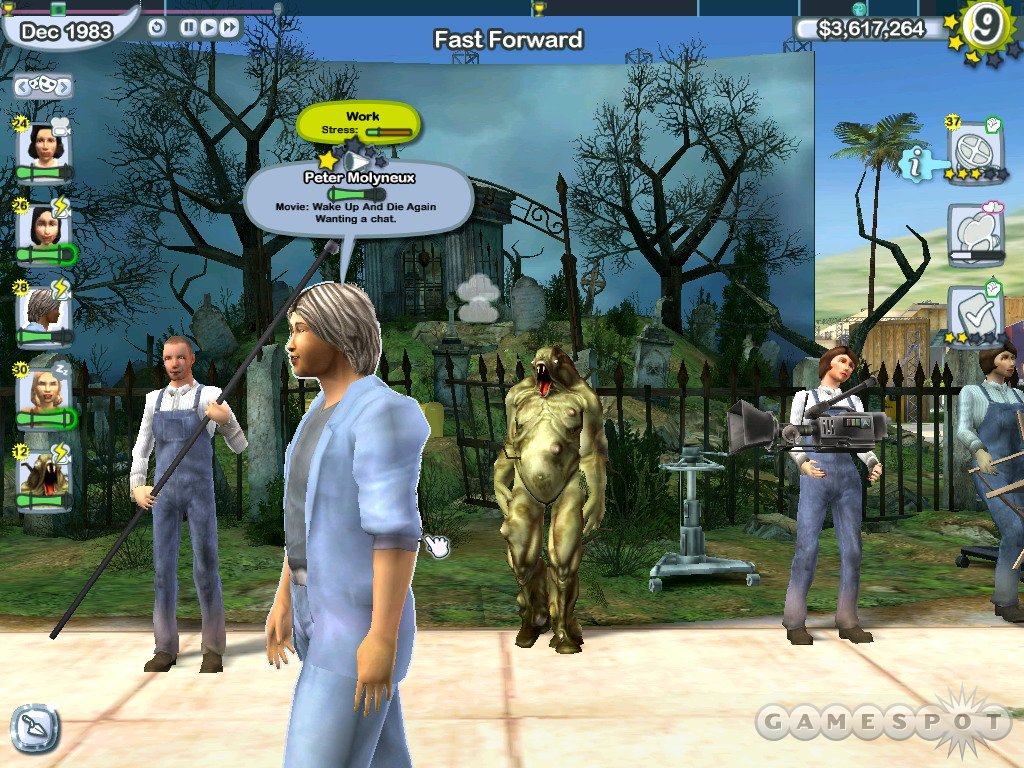There are two distinct experiences offered in The Movies, the latest game from Peter Molyneux's Lionhead Studios. The bulk of The Movies centers around a familiar business-management "tycoon" experience, where you play master and commander of your very own Hollywood movie studio, hiring and firing staff, building facilities, and, of course, producing and releasing movies. You can choose to either let your studio machine determine the content of your films, or you can go hands-on with the game's built-in moviemaking tools, which peg a good balance between accessibility and flexibility. Both parts of The Movies can be engrossing and time-consuming, but they feel more like parallel products rather than an integrated whole.

Kicking things off in 1920, The Movies starts you as the chief of a small upstart movie studio, putting the challenge before you to slowly cultivate it into a top-grossing, award-winning cinematic machine staffed with the best and the brightest talent--both onscreen and off--the industry has to offer. Well, as less of a challenge and more of a suggestion, the free-form (or so-called "sandbox") nature of The Movies means you can go about your business however you see fit, without a "wrong" or a "right" way. The game starts out extremely slowly by carefully guiding you through the process of hiring studio staff (like janitors and builders), helping you decide which cinematic hopefuls will be actors and directors (and which ones will be extras or film crew), building your first set, and releasing your first movie. This handholding remains pretty intensive for your first few decades as a movie mogul--and that's a good thing, because there's a lot to digest.
The core moviemaking process itself can be pretty dense. First, you'll need a screenplay, which means you can choose to write your own (more on that later), or you can hire a staff of screenwriters to do the heavy lifting for you. Even with the latter hands-off approach, you'll still have to determine the genre of your film, with the given choices of action, comedy, romance, sci-fi, and horror. Different genres have greater general interest in different eras, so even if the film itself is good, the wrong genre at the wrong time could spell box-office disaster. Once you have your screenplay in hand, it's time for casting. The size of your cast and crew will grow over time as you produce bigger, more-sophisticated movies. But in the end, you're always going to need a director, some actors, a movie crew, and, usually, a handful of extras. Who you choose to fill these roles will ultimately affect your end product. How experienced is your crew? What sort of mood is your talent in? Do the director and the lead actor get along well? Though it can make the process of casting your movies quite maddening, it's actually rather impressive to realize the minute details that can have an impact.
You don't have much control once shooting commences, though that doesn't mean you shouldn't keep a watchful eye over the production. Though most of your employees are basically just automatons doing the job assigned to them, actors and directors are much more complicated, emotional creatures, requiring significant quantities of your attention. Their true characters will often be revealed under the duress of filming, informed by a dozen or so different stats unique to each person. Most of your problems basically come down to stress--and how your talent deals with it. A stressed-out actor or director won't turn in a very good performance, and he or she will often turn to food and drink for comfort. This is tolerable in moderation, but some people have a greater proclivity toward vice than others, which, if left unchecked, can bring a production to a screeching halt. In turn, this can send the cost of your production through the roof as you send the person to your own private in-studio rehab center.

There are stress factors aside from production, too, most of which are rooted in your talent's ego. If your talent feels he or she isn't getting paid enough, his or her trailer isn't nice enough, he or she doesn't have a big enough entourage, or he or she's generally unhappy about his or her personal appearance, the talent will get grumpy right quick. Most of these problems are solved pretty simply with pay raises, better trailers, personal assistants, makeovers, plastic surgery, and/or press exposure. There's a lot of information to sift through, and the game usually does a superb job of surfacing what's relevant, though at times the screen can become totally cluttered with pop-up info bubbles. It can be fascinating how your talent grows and changes while living under the spotlight, but over time you'll see the same sorts of behavioral patterns emerging over and over again--which means the constant micromanagement can get exhausting.
Talent will grow old and eventually retire (unless he or she quits or is sold to another studio before hitting the age of 70), which brings us to one of the more peculiar quirks in The Movies. In the beginning, you'll have a surplus of hopefuls looking to join your studio. But this can taper off quickly. Problems start to arise when you expand your studio lot with new sets and various facilities and soon find that you don't have enough builders to maintain the grounds. You'll find yourself pulling people off of jobs--jobs they might already be really good at--just to fulfill a lesser position that is of more immediate urgency. Abstractly, as a mechanic in a strategy game, this isn't inherently bad. It just doesn't feel appropriate--it just ain't Hollywood.
Maintaining and developing your studio facilities can prove just as consuming as pampering your stars, and is often just as necessary. The moviegoing audience will stop showing up if you use the same sets over and over again, so regularly building new sets helps alleviate that. Most of the facilities and sets you can choose to build aren't available from the outset, instead slowly unlocking over time. You can, however, speed things up (giving yourself a technological edge over the competition) by investing in a research and development facility and staff. You'd be surprised at how some novel sets and slick special effects can turn a stinker into a blockbuster. Well, maybe not that surprised.

There is a whole lot going on in The Movies, but the game is smart about letting you determine your own pace, and you can even scale the amount of assistance the game provides. Once you find your gait, the experience can be really addictive, and the constant production pattern of making movies and improving your back lot make it quite easy to ignore the fact that, all of a sudden, it's four in the morning and you're still playing.
If you want to get really involved in the fake filmmaking process, The Movies includes an incredible set of in-game moviemaking tools that let you create your own little masterpieces. At its most basic, you're given a timeline and the frame for a story arc. Anyone familiar with digital video editing will find this to be like a Playskool version of something like FinalCut or Premiere. You fill in your story by dragging and dropping prebuilt shots, of which there are literally dozens to choose from for any one portion of the story arc. Like the rest of the game, the moviemaker can be tuned to give you just the amount of control you're comfortable with. If you're happy with just dragging and dropping a few scenes into a timeline and letting that be that, you can operate that way...though the real fun here is getting really crazy with the details, such as lighting, the mood of the performances, the backdrop designs, the types of camera angles used, and so on. You can even add subtitles, sound effects, your own custom musical score, and, if you've got a microphone, your own dialog. Given the dozens of different sets you'll eventually have at your disposal, in addition to the five different genres you can work within and the insane amount of control you can take over virtually every single detail of your movie, there is a great amount of potential here for budding virtual filmmakers.
Unfortunately, you can pour hours into creating your own perfect piece of machinima, and it will have minimal impact inside the game itself, as the game judges the quality of the films rather mechanically, without much capacity to discern between what's garbage and what's art. In a way, this is acceptable, since the end product of the movie you've made is really the best reward. Plus, the game makes it quite easy to export the movies you've made into a common video format that you can share with others. There's even an integrated tool that makes it easy to upload your movies to the Internet for all to see. Really, with the inclusion of a sandbox mode that lets you skip the "game" part of The Movies almost entirely, it's pretty apparent that the whole package was designed with two separate, largely unrelated goals in mind. It's not a deal breaker, but it does mar the illusion that you're running your movie studio in a living, breathing world.
The amount of control you're given in The Movies and the sort of social-experiment focus it takes on are just a few of the qualities shared with EA's wickedly popular suburban lifestyle simulation, The Sims. This is amplified by the fact that The Movies is pretty shameless in the way that it cribs its realistic-yet-slightly-exaggerated visual style from The Sims. When you're looking at your studio from the ground level, it's not particularly impressive. Models look natural but simple, textures are generally clean-looking, though a little flat, and fancy lighting and particle effects are few and far between. What impresses, though, is the way that you can seamlessly zoom out from ground level to bird's-eye view in one smooth motion, without any load times. It's worth mentioning, though, that despite the relatively modest system requirements listed by the publisher, The Movies can really test the upper limits of your machine, and the frame rate can chug on even a high-end PC when you max out all the quality settings.
The sound design is a good match for the general cinematic tone of the game. The background music that plays while you manage your studio will change as you progress through different time periods, from brassy big-band accompaniments, to buzzy Hendrixian guitars, to funky wah-wah sounds, and beyond. There's some good, funny voice work in the game, with different news readers and disc jockeys delivering era-specific parody over your studio's PA system, though all the "dialogue" in your movies is spoken in a Sims-esque gibberish that's not nearly as fully realized as the made-up "simlish" language.

This is a game of high quality, and it shows in virtually every aspect of its execution. But all told, The Movies comes just shy of its lofty ambitions. Being a movie studio boss is completely absorbing, and there is really no other game, or, really, any piece of software that makes it as easy to build your own little movies. But the connection between these concepts is tenuous at best. Thankfully, its best qualities shine through more than enough to make The Movies a game well worth playing.